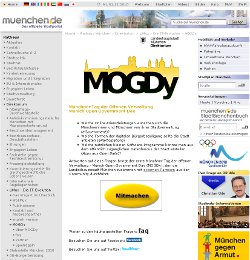Only articles in with the "inenglish" tag are displayed
To display all articles click
here.
 |
3. March 2011 – 11:02 by John Heaven (TuTech Innovation GmbH)
|

Photo by Techie Kev on Flickr.com
As reported in the Guardian, Walsall City Council is conducting a 24 hour experiment to publicise what it does. Starting at 6.00 UK time today, four Twitter streams will be pumping out updates from nuisance neighbour reports to pest control.
The Twitter accounts @walsall24_1 to @walsall24_6 have been reserved, although at the time of writing only two seem to be tweeting — presumably the rest have been reserved to prevent spoofers setting up bogus accounts (which, to my juvenile mind, seems a bit of a shame).
The experiment follows a similar campaign by Manchester Police, who tweeted over a 24 hour period recently.
For more information, see the Walsall City Council website: https://www.walsall.gov.uk/walsall24.htm.
PS: There’s a free candy floss and a goldfish if you understood the pun in the title.
Posted in Uncategorized | No Comments »
 |
19. January 2011 – 11:44 by John Heaven (TuTech Innovation GmbH)
|
A report to the European Commission recently called upon Member States to step up their efforts to digitise catalogues of cultural works including books and paintings. This presents some challenges which I think help us to reflect on issues surrounding open data.
The act of digitising works costs money and doing it properly – ensuring that prints are of a high quality and high enough resolution to make them useful – can be expensive. As with any expenditure, public organisations have to demonstrate that their investment is justified by a public need or that they can recoup the money by selling what they produce. This is exactly what Birmingham Museum and Art Gallery has done by selling on-demand prints of their works online. The argument that these works are public property and should be available free of charge may hold in principle, but if all works are made freely available then the funding must come from elsewhere or they simply won’t be digitised in the first place.
I think the same applies to open data: the data may be on paper, or uncollected. The act of collating this data simply for the purpose of making it public costs money and this investment will need to be justified against many other competing demands on the public purse. Where data is already in digital form and it is simply a case of putting a spreadsheet on the internet, the argument is more straightforward; but when it costs money to collect it and make it available it is more complicated, especially if the data is already a source of income. Why would you want to give companies that happily pay handsome sums for, say, mapping data this information free of charge? Why spend lots of money collating data that perhaps nobody will use?
The Localism Bill (see previous article) attempts to solve this by releasing data according to the wishes of local residents. I think we should be exploring other ways of ensuring that data remains a source of income whilst being available for people like community activists and volunteers who want to use data to improve their surroundings.
Public authorities should think about making data available under a Creative Commons licence. This could allow them to preserve their income streams by prohibiting commercial use, whilst allowing people to use the data for personal and voluntary means. It may even encourage more people to buy their datasets by giving them the option to “try before they buy”. Further, there may be some instances where a private company can work with a public authority to collect data for its own purposes and at its own expense. By obliging the company that collects the information to make it available for non-profit public use, this may be a way of covering the costs of data collection whilst retaining the principle of openness.
Posted in open data, Trends | 2 Comments »
 |
17. December 2010 – 17:25 by John Heaven (TuTech Innovation GmbH)
|
You’ve joined us for live chats on the blog, taken part in our online discourses, chatted to us at conferences, read PEP-NET members’ articles, and downloaded the free PEP-NET Issue of JEDEM. Eighty-six of you even came to Hamburg to join us for the PEP-NET Summit. Before the year is out, we would like to ask you take part in one final activity: our survey “Looking Forward, Looking Back: eParticipation Trends in 2010 and 2011.”
So what were the main trends in 2010? What areas of eParticipation made particular progress, and what events defined the eParticipation calendar? And while you are thinking about trends, what do you think will be up and coming in 2011? Nobody can predict the future, but it will be interesting to find out how 2010 was for friends of PEP-NET, and what they expect in 2011.
When I’m back in the New Year, I’ll put together a summary of results. I think it will make for interesting reading – but only if you take part, that is!
In the meantime, from Edinburgh to Athens, Madrid to Minsk: wherever you are, Merry Christmas and a Happy New Year!
Posted in members, Trends, Visions | No Comments »
 |
15. December 2010 – 10:25 by John Heaven (TuTech Innovation GmbH)
|
Far from winding down for Christmas, this week sees a lot of European eParticipation-related activity in Brussels and Strasbourg. The launch of the eGovernment Action Plan, the presentation of the Citadel Statement and the expected adoption of regulations on the European Citizens’ Initiative by the European Parliament in Strasbourg mean that this is a busy week for European eParticipation enthusiasts.
At the “Lift Off Towards Open Government” in Brussels, Digital Agenda Commissioner and Vice President of the European Commission Neelie Kroes will launch the eGovernment Action Plan 2015. Following the launch, the conference will hear from eParticipation and eGovernment actors from the Commission and across Europe.
At the pre-conference yesterday, Geert Bourgeois (Vice Minister-President of the Flemish Government and Flemish Minister for Administrative Affairs, Local and Provincial Government) launched the Citadel Statement, a pan-European declaration that aims to identify what local government really needs to deliver on the vision set forth in last year’s Malmo Ministerial Declaration on e-government. The Citadel Statement, the result of an open discussion in which anyone could makes suggestions and vote on other people’s suggestions, is broken down into the following headings:
- Common Architecture, Shared Services and Standards
- Open Data, Transparency and Personal Rights
- Citizen Participation and Involvement
- Privacy and Identification of Individuals
- Rural inclusion
Click here for a PDF version of the full press release.
Finally, the European Parliament will vote on regulations that specify in more detail arrangements regarding the European Citizens’ Initiative. The Lisbon Treaty made provision for one million citizens to force the Commission to consider initiating legislation in any area within its remit. A recent petition online called on the Parliament to adopt “effective regulations for the European Citizens’ Initiative”; see my previous post.
Geert Bourgeois, Vice-Minister-President of the Flemish Government and Flemish Minister for Administrative Affairs, Local and Provincial Government
Posted in Events, News, Trends | No Comments »
 |
1. December 2010 – 14:40 by John Heaven (TuTech Innovation GmbH)
|

Screenshot from MOGDy website
They say a week is a long time in politics, and in eParticipation a day is just as long: Munich Open Government Day (MOGDy) is lasting, er, several months.
Starting today, the City of Munich is asking citizens to answer three questions using its dedicated online platform:
- what online services should the local government provide?
- what eParticipation initiatives should the city engage in?
- what apps could make use of the data that the city will shortly release?
Any citizen can suggest ideas and rate other people’s ideas. The five people with the top ideas will get tickets to the Oktoberfest. At the MOGDy Camp on 21st and 22nd January 2011, the city will launch its open data programme in which it will be releasing data and encouraging developers to get stuck in and create useful apps out of them. The best apps will be awarded prizes and the City will present them online.
Posted in Uncategorized | No Comments »
 |
26. November 2010 – 14:05 by John Heaven (TuTech Innovation GmbH)
|

It *is* snowing outside my office
Like the snowflakes that are starting to cover a wintery Hamburg, the votes for this petition are coming in thick and fast. As I write, 131,458 people have put their names to a petition calling on European governments, members of the European Parliament and the President of the European Commission to “adopt effective regulations for the European Citizens’ initiative”.
Read the rest of this entry »
Posted in Uncategorized | No Comments »
 |
26. November 2010 – 13:38 by John Heaven (TuTech Innovation GmbH)
|
PublicDecisions, the US-based online academy for stakeholder engagement, is holding an online conference on online interactive games and mobile applications (or “apps”) that support public engagement. You can submit proposals for presentations until Wednesday 12th January 2011.
For further details, see their blog.
Thanks to Janice from PEP-NET member Involve for the tip-off!
Posted in Uncategorized | No Comments »
 |
18. November 2010 – 10:32 by John Heaven (TuTech Innovation GmbH)
|

Manuel Kripp, MD of E-Voting.cc
Manuel Kripp, Managing Director of PEP-NET member E-Voting.cc, recently visited the US during the mid-term elections, so I was very curious to find out what he had got up to. We spoke about electronic voting machines, the role of social media in the US elections, and the need for change management when introducing E-Voting technology.
To find out what E-Voting.cc does, see their website or my previous interview with Manuel’s predecessor Robert Krimmer.
John Heaven: Hi Manuel. I hear you’ve been travelling recently. What were you up to?
Manuel Kripp: I was invited to participate in the 2010 U.S. election program organised by the International Foundation for Electoral Systems (IFES), and by the the Electoral Assistance Commission (EAC) to observe the election on Tuesday 2nd November.
The conference was well attended by experts from around the world, including Thomas Wilkie (Chief Executive, IFAS), Doug Chapin (Pew Centre on the States), and Bob Carey (Federal Voting Assistance Program). The Jo C. Baxter prize was presented to Dr Kwadwo Afari-Gyan, Chairman of Ghana’s Electoral Commission, for invaluable contributions to democracy in Ghana.
The focus of my visit was on seeing how elections are conducted in other countries from around the world, and comparing the US electoral system with how things are done in Europe.
Read the rest of this entry »
Posted in Interview, members, News, Trends, Visions | No Comments »
 |
17. November 2010 – 16:42 by Bengt Feil (TuTech Innovation GmbH)
|
 Climate change is a reality and there is a significant increase of natural disasters as a result. Whether you look at Pakistan or Brandenburg news of floods or broken dikes is reaching us with alarming frequency. The metropolitan area of Hamburg in Germany has to prepare itself to be hit by these kinds of disasters like any other major city close to the sea. There is a need to develop sustainable measures to cope with the danger posed by climate change in the next decades.
Climate change is a reality and there is a significant increase of natural disasters as a result. Whether you look at Pakistan or Brandenburg news of floods or broken dikes is reaching us with alarming frequency. The metropolitan area of Hamburg in Germany has to prepare itself to be hit by these kinds of disasters like any other major city close to the sea. There is a need to develop sustainable measures to cope with the danger posed by climate change in the next decades.
On November 15th the online discourse “Floods in Hamburg – What reaction is necessary” was launched to discuss the dangers and potential measures against more frequent flood incidents. Citizens and experts are invited to visit hochwasser-nord.de and post their ideas and comments on how the city should be prepared for the future. Furthermore the website offers in-depth information on the possibilities to protect against floods and to adapt to them developed by companies and scientists.
The discussion will run for three weeks and has been initialized by the research project KLIMZUG-NORD, which has been mentioned on PEP-NET before. The project tries to develop a strategy to adapt large metropolitan area, like Hamburg, to the effects of climate change.
The results of the online discourse will provide important hints at what measures are acceptable to the public and will be integrated into the adaption strategy.
Posted in Projects | No Comments »
 |
16. November 2010 – 12:00 by John Heaven (TuTech Innovation GmbH)
|

Birmingham's Virtual Library. Click for larger image
It’s easy to reject Second Life as an eParticipation platform, but Birmingham City Council is just about to launch a virtual model of the planned £193m Library of Birmingham. I spoke to representatives of the Council and the company that they are working with to find out what they are doing, and how they are making the virtual library accessible to a wide audience. What I found was fascinating, and I really think Second Life deserves a second look.
Second Life is a virtual world that allows users to assume a second identity and explore a digital three-dimensional world. It’s not difficult to see how this could be used to enable people to “go” to places they wouldn’t otherwise visit, network with people from far away, or take part in virtual events. That’s the theory; but my big issue with Second Life is that it is a very niche audience and it takes quite a lot of effort to download the software and work out how to use it. Once you’re in there, it’s great to be able to look at these virtual buildings and access information; but I can view videos, read text, and chat to friends much more easily using the internet outside Second Life. So why would a city council be interested in Second Life? Read the rest of this entry »
Posted in good practice, Interview, News, Projects, Tools, Trends, Visions | 2 Comments »





 Climate change is a reality and there is a significant increase of natural disasters as a result. Whether you look at Pakistan or Brandenburg news of floods or broken dikes is reaching us with alarming frequency. The metropolitan area of Hamburg in Germany has to prepare itself to be hit by these kinds of disasters like any other major city close to the sea. There is a need to develop sustainable measures to cope with the danger posed by climate change in the next decades.
Climate change is a reality and there is a significant increase of natural disasters as a result. Whether you look at Pakistan or Brandenburg news of floods or broken dikes is reaching us with alarming frequency. The metropolitan area of Hamburg in Germany has to prepare itself to be hit by these kinds of disasters like any other major city close to the sea. There is a need to develop sustainable measures to cope with the danger posed by climate change in the next decades.






